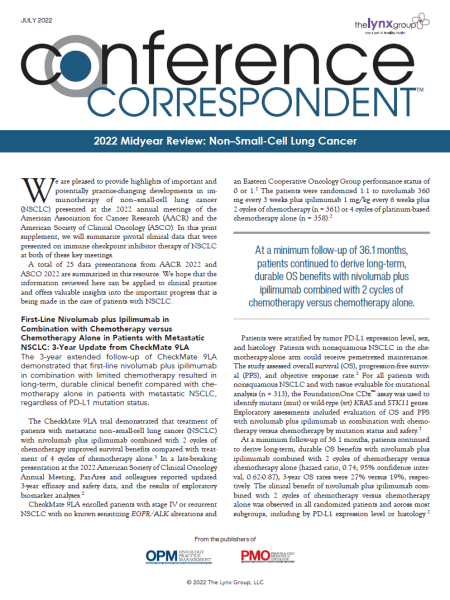Personalized or precision medicine utilizes concepts based on genetic and environmental factors to prevent, diagnose, and treat disease using an individualized approach.1 Specific enzymes, growth factor receptors, and signal transducers are targeted, causing interference with a variety of oncogenic cellular processes.1 The development of treatment using targeted therapies is paving the way for improving patient care.1
Diagnostic testing is often required in targeted cancer treatment to analyze biological samples.2 These are used to analyze and evaluate specific biomarkers. Cancer biomarkers encompass molecules such as proteins or genetic alterations, including mutations, rearrangements, or fusions. Biomarkers can be diagnostic, prognostic, or monitoring, and can inform about susceptibility and risk or therapeutic selection biomarkers.2
A number of factors influence patient access to appropriate biomarker testing.2 First, there must be tests that are trustworthy, valid, and relevant. The strong link between a test’s performance and clinical decisions made as a result of the test, such as the start of a targeted cancer therapy, emphasizes the necessity for commercially available tests to be well-validated. Second, as new and proven tests become available, insurer coverage plays a key role in provider adoption and patient access. Patients will be denied access if they do not have insurance coverage. Third, testing relies on skilled healthcare practitioners who know which tests to use when and how to use the data in their patients’ care. Clinical treatment guidelines are important in guiding practice; thus, they must be revised on a regular basis as new information emerges linking biomarkers to targeted medicines. Finally, healthcare facilities must have the proper testing infrastructure in place for the efficient and adequate collection and handling of tissue for testing, as well as health information technology to manage testing data and help healthcare clinicians in clinical decision-making.2
Genomic testing presents several clinical and logistical obstacles for community-based oncologists, according to the current retrospective “real-world evidence” study.3 Inadequate tissue due to sequential or parallel testing, as well as unacceptably long response times, are among the issues. Additional challenges include a lack of integration of biomarker testing into ordinary pathology practice and concern over reimbursement. New technologies, such as “liquid” biopsies, could be used as a solution (useful when the initial tissue biopsy is insufficient for genotyping or to detect acquired mutations at disease progression). Although there are still limitations in genetic biomarker testing, there is potential to increase guideline adherence.3
Patients should be given correct information so that they may actively engage in their healthcare decisions.2 The advantages of including precision medicine testing (such as biomarker testing) in a patient with a cancer treatment plan highlight the need for better patient awareness and understanding so that patients can seek appropriate testing.2
Biomarker testing, as well as being eligible for and receiving targeted cancer therapy, has been shown to enhance progression-free survival and overall survival in patients with cancer.2 It will be critical to identify and resolve barriers to appropriate biomarker testing as precision medicine changes the way healthcare providers and patients think about cancer treatments. It will take buy-in from a wide range of stakeholders across the healthcare system to overcome these obstacles.2
References
- Tsimberidou A-M. Targeted therapy in cancer. Cancer Chemother Pharmacol. 2015;76:1113-1132.
- American Cancer Society Cancer Action Network. Improving access to biomarker testing. September 20, 2020. www.fightcancer.org/policy-resources/improving-access-biomarker-testing. Accessed December 9, 2021.
- Gutierrez ME, Choi K, Lanman RB, et al. Genomic profiling of advanced non-small cell lung cancer in community settings: gaps and opportunities. Clin Lung Cancer. 2017;18:651-659.

